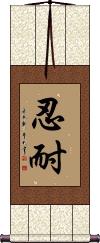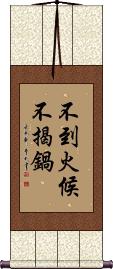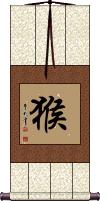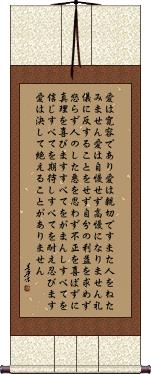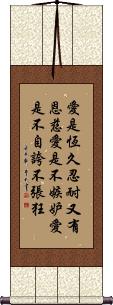Many custom options...
And formats...

Be Patient in Chinese / Japanese...
Buy a Be Patient calligraphy wall scroll here!
Personalize your custom “Be Patient” project by clicking the button next to your favorite “Be Patient” title below...
1. Patience Yields Peace of Mind
2. Patience / Perseverance / To Endure / Tolerant
3. Do not take action until the time is right
4. Monkey
Patience Yields Peace of Mind
Patience / Perseverance / To Endure / Tolerant
忍耐 is patience, the quiet hope, and trust that things will turn out right.
You wait without complaining. You are tolerant and accepting of difficulties and mistakes. You picture the end in the beginning and persevere to meet your goals.
忍耐 can also mean “to endure,” “restrain oneself,” or “forbearance,” and in some contexts, it can mean “perseverance” or “endurance.”
忍耐 is also used as a tenet of Taekwondo, Tang Soo Do, and other Korean martial arts where it's titled “Endurance” and romanized as “In Neh.”
![]() Note that when writing this as Kanji, Japanese will tend to write the first character in the form shown to the right. If you select our Japanese master calligrapher, please expect this Kanji form (yes,
it’s
just one stroke that is slightly different in location, crossing another stroke in the Japanese Kanji form).
Note that when writing this as Kanji, Japanese will tend to write the first character in the form shown to the right. If you select our Japanese master calligrapher, please expect this Kanji form (yes,
it’s
just one stroke that is slightly different in location, crossing another stroke in the Japanese Kanji form).
See Also: Peace | Harmony | Perseverance
Do not take action until the time is right
Monkey
Year of the Monkey / Zodiac Sign
猴 is the monkey character in Chinese.
猴 means ape in Japanese due to an error made long ago as Japan absorbed Chinese characters.
If you were born in the year of the monkey, you . . .
Are smart, brave, active, and competitive.
Like new things.
Have a good memory.
Are quick to respond
Have an easy time winning people's trust.
Are, however, not very patient.
See also our Chinese Zodiac page.
Note: This character does have the meaning of monkey in Korean Hanja but is not used very often.
1 Corinthians 13:4-8
Here is 1st Corinthians 13:4-8 (just the first sentence of verse 8) in Japanese.
In the familiar NIV, this would read:
Love is patient, love is kind. It does not envy, it does not boast, it is not proud.
It does not dishonor others, it is not self-seeking, it is not easily angered, it keeps no record of wrongs.
Love does not delight in evil but rejoices with the truth.
It always protects, always trusts, always hopes, always perseveres.
Love never fails...
The Japanese text is from the 新改訳聖書 (Shinkaiyaku) or New Japanese Bible. Popular among most Protestant denominations in modern Japan.
Note: Because this selection contains some special Japanese Hiragana characters, it should be written by a Japanese calligrapher.
Corinthians 13:4
愛は忍耐強い。愛は情け深い。ねたまない。愛は自慢せず、高ぶらない。is 1st Corinthians 13:4 in Japanese.
In English, this reads:
1st Corinthians 13:4 (KJV) Charity suffereth long, and is kind; charity envieth not; charity vaunteth not itself, is not puffed up...
1st Corinthians 13:4 (NIV) Love is patient, love is kind. It does not envy, it does not boast, it is not proud.
1st Corinthians 13:4 (Basic English) Love is never tired of waiting; love is kind; love has no envy; love has no high opinion of itself, love has no pride.
If you want a big “love” character written above the verse on your artwork, just make a note in the “special instructions” tab when you are customizing your artwork. There is no extra charge for that service on this special verse.
Note: Because this selection contains some special Japanese Hiragana characters, it should be written by a Japanese calligrapher.
Corinthians 13:4
All you need to know about LOVE
愛是恆久忍耐又有恩慈愛是不嫉妒愛是不自誇不張狂 is 1st Corinthians 13:4 in Chinese.

With large “love” character added.
In English, this reads:
1st Corinthians 13:4 (KJV) Charity suffereth long, and is kind; charity envieth not; charity vaunteth not itself, is not puffed up...
1st Corinthians 13:4 (NIV) Love is patient, love is kind. It does not envy, it does not boast, it is not proud.
1st Corinthians 13:4 (Basic English) Love is never tired of waiting; love is kind; love has no envy; love has no high opinion of itself, love has no pride.
The Chinese translation follows the love meaning, rather than the King James' use of “charity.” I was a little confused when writing this description with the significant differences between the NIV vs. KJV translations. After speaking to a Greek scholar about this, it would seem that the KJV has an almost errant translation with the use of “charity” in place of “love.”
We used the most popular Christian Chinese Bible, which is the Chinese Union Version (CUV). The CUV was first published in 1919. We use this so that the Chinese translation would be as accurate and standard as possible. Any Chinese Christian worth their salt will easily be able to identify this verse when they see these characters.
If you want a big “love” character written above the verse on your artwork, just make a note in the “special instructions” tab when you are customizing your artwork. There is no extra charge for that service on this special verse.
Not the results for be patient that you were looking for?
Below are some entries from our dictionary that may match your be patient search...
| Characters If shown, 2nd row is Simp. Chinese |
Pronunciation Romanization |
Simple Dictionary Definition |
看 see styles |
kàn kan4 k`an kan ikuma いくま |
to see; to look at; to read; to watch; to visit; to call on; to consider; to regard as; to look after; to treat (a patient or illness); to depend on; to feel (that); (after a verb) to give it a try; to watch out for (personal name) Ikuma Look, see; watch over. |
証 证 see styles |
zhèng zheng4 cheng shou / sho しょう |
to admonish; variant of 證|证[zheng4] (1) proof; evidence; (suffix noun) (2) certificate; license; permit; membership card; ID card; (3) {Buddh} enlightenment; (4) symptoms (in Chinese medicine); patient's condition; (given name) Shou |
上忍 see styles |
shàng rěn shang4 ren3 shang jen jounin / jonin じょうにん |
Ninja clan master; highest-ranking ninja exceedingly patient |
主訴 主诉 see styles |
zhǔ sù zhu3 su4 chu su shuso しゅそ |
(medicine) to complain of; a patient's brief account of their illness; (law) main suit; principal claim {med} chief complaint |
五忍 see styles |
wǔ rěn wu3 ren3 wu jen gonin |
The five stages of bodhisattva-kṣānti, patience or endurance according to the 別教: (1) 伏忍the causes of passion and illusion controlled but not finally cut off, the condition of 十住, 十行, and 十廻向; (2) 信忍 firm belief, i. e. from the 初地 to the 三地; (3) 順忍 patient progress towards the end of all mortality, i. e. 四地 to 六地; (4) 無生忍 patience for full apprehension, of the truth of no rebirth, 七地 to 九地; and (5) 寂滅忍 the patience that leads to complete nirvana, 十地 to 妙覺; cf. 五位. |
人球 see styles |
rén qiú ren2 qiu2 jen ch`iu jen chiu |
person who is passed back and forth, with nobody willing to look after them (e.g. a child of divorced parents); (esp.) patient who gets shuttled from hospital to hospital, each of which refuses to admit the patient for treatment |
介病 see styles |
kaibyou / kaibyo かいびょう |
(noun/participle) nursing a patient |
信忍 see styles |
xìn rěn xin4 ren3 hsin jen shinnin |
Faith-patience, faith-endurance: (1) To abide patiently in the faith and repeat the name of Amitābha. (2) To believe in the Truth and attain the nature of patient faith. (3) According to Tiantai the 別教 meaning is the unperturbed faith of the Bodhisattva (that all dharma is unreal). |
備皮 备皮 see styles |
bèi pí bei4 pi2 pei p`i pei pi |
to prep a patient's skin prior to surgery (shaving hair, cleansing etc) |
八忍 see styles |
bā rěn ba1 ren3 pa jen hachinin |
The eight kṣānti, or powers of patient endurance, in the desire-realm and the two realms above it, necessary to acquire the full realization of the truth of the Four Axioms, 四諦; these four give rise to the 四法忍, i.e. 苦, 集, 滅, 道法忍, the endurance or patient pursuit that results in their realization. In the realm of form and the formless, they are called the 四類忍. By patient meditation the 見惑 false or perplexed views will cease, and the八智 eight kinds of jñāna or gnosis be acquired; therefore 智 results from忍 and the sixteen, 八忍八智 (or 觀), are called the 十六心, i.e. the sixteen mental conditions during the stage of 見道, when 惑 illusions or perplexities of view are destroyed. Such is the teaching of the 唯識宗. The 八智 are 苦, 集, 滅,道法智 and 苦, etc. 類智. |
再發 再发 see styles |
zài fā zai4 fa1 tsai fa |
to reissue; (of a disease) to recur; (of a patient) to suffer a relapse |
出診 出诊 see styles |
chū zhěn chu1 zhen3 ch`u chen chu chen |
to visit a patient at home (of a doctor); house call |
勘忍 see styles |
kannin かんにん |
(noun/participle) (1) patience; patient endurance; forbearance; tolerance; (2) forgiveness; pardon |
十地 see styles |
shí dì shi2 di4 shih ti juuji / juji じゅうじ |
{Buddh} dasabhumi (forty-first to fiftieth stages in the development of a bodhisattva); (place-name) Jūji daśabhūmi; v. 十住. The "ten stages" in the fifty-two sections of the development of a bodhisattva into a Buddha. After completing the十四向 he proceeds to the 十地. There are several groups. I. The ten stages common to the Three Vehicles 三乘 are: (1) 乾慧地 dry wisdom stage, i. e. unfertilized by Buddha-truth, worldly wisdom; (2) 性地 the embryo-stage of the nature of Buddha-truth, the 四善根; (3) 八人地 (八忍地), the stage of the eight patient endurances; (4) 見地 of freedom from wrong views; (5) 薄地 of freedom from the first six of the nine delusions in practice; (6) 離欲地 of freedom from the remaining three; (7) 巳辨地 complete discrimination in regard to wrong views and thoughts, the stage of an arhat; (8) 辟支佛地 pratyeka-buddhahood, only the dead ashes of the past left to sift; (9) 菩薩地 bodhisattvahood; (10) 佛地 Buddhahood. v. 智度論 78. II. 大乘菩薩十地 The ten stages of Mahāyāna bodhisattva development are: (1) 歡喜地 Pramuditā, joy at having overcome the former difficulties and now entering on the path to Buddhahood; (2) 離垢地 Vimalā, freedom from all possible defilement, the stage of purity; (3) 發光地 Prabhākarī, stage of further enlightenment; (4) 焰慧地 Arciṣmatī, of glowing wisdom; (5) 極難勝地 Sudurjayā, mastery of utmost or final difficulties; (6) 現前地 Abhimukhī, the open way of wisdom above definitions of impurity and purity; (7) 遠行地 Dūraṁgamā, proceeding afar, getting above ideas of self in order to save others; (8) 不動地 Acalā, attainment of calm unperturbedness; (9) 善慧地 Sādhumatī, of the finest discriminatory wisdom, knowing where and how to save, and possessed of the 十力 ten powers; (10) 法雲地 Dharmamegha, attaining to the fertilizing powers of the law-cloud. Each of the ten stages is connected with each of the ten pāramitās, v. 波. Each of the 四乘 or four vehicles has a division of ten. III. The 聲聞乘十地 ten Śrāvaka stages are: (1) 受三歸地 initiation as a disciple by receiving the three refuges, in the Buddha, Dharma, and Saṅgha; (2) 信地 belief, or the faith-root; (3) 信法地 belief in the four truths; (4) 内凡夫地 ordinary disciples who observe the 五停心觀, etc.; (5) 學信戒 those who pursue the 三學 three studies; (6) 八人忍地 the stage of 見道 seeing the true Way; (7) 須陀洹地 śrota-āpanna, now definitely in the stream and assured of nirvāṇa; (8) 斯陀含地 sakrdāgāmin, only one more rebirth; (9) 阿那含地 anāgāmin, no rebirth; and (10) 阿羅漢地 arhatship. IV. The ten stages of the pratyekabuddha 緣覺乘十地 are (1) perfect asceticism; (2) mastery of the twelve links of causation; (3) of the four noble truths; (4) of the deeper knowledge; (5) of the eightfold noble path; (6) of the three realms 三法界; (7) of the nirvāṇa state; (8) of the six supernatural powers; (9) arrival at the intuitive stage; (10) mastery of the remaining influence of former habits. V. 佛乘十地 The ten stages, or characteristics of a Buddha, are those of the sovereign or perfect attainment of wisdom, exposition, discrimination, māra-subjugation, suppression of evil, the six transcendent faculties, manifestation of all bodhisattva enlightenment, powers of prediction, of adaptability, of powers to reveal the bodhisattva Truth. VI. The Shingon has its own elaborate ten stages, and also a group 十地十心, see 十心; and there are other groups. |
嘗糞 尝粪 see styles |
cháng fèn chang2 fen4 ch`ang fen chang fen shoufun / shofun しょうふん |
to taste a patient's excrement (a form of medical examination, seen as an act of loyalty or filial piety); to suck up to sb; to kiss ass shamelessly flattering; brown-nosing; licking excrement |
堪忍 see styles |
kān rěn kan1 ren3 k`an jen kan jen kannin かんにん |
(noun/participle) (1) patience; patient endurance; forbearance; tolerance; (2) forgiveness; pardon sahā; to bear, patiently endure. |
忍仙 see styles |
rěn xiān ren3 xian1 jen hsien ninsen |
The patient ṛṣi, or immortal of patience, i.e. the Buddha. |
忍善 see styles |
rěn shàn ren3 shan4 jen shan ninzen |
The patient and good; or patient in doing good. |
忍水 see styles |
rěn shuǐ ren3 shui3 jen shui ninsui |
Patience in its depth and expanse compared to water. |
忍調 忍调 see styles |
rěn diào ren3 diao4 jen tiao ninchō |
Patiently to harmonize, i.e. the patient heart tempers and subdues anger and hatred. |
忍讓 忍让 see styles |
rěn ràng ren3 rang4 jen jang |
to exercise forbearance; patient and accommodating |
患畜 see styles |
kanchiku かんちく |
animal under treatment; patient (referring to pets) |
患者 see styles |
huàn zhě huan4 zhe3 huan che kanja かんじゃ |
patient; sufferer patient |
慢性 see styles |
màn xìng man4 xing4 man hsing mansei / manse まんせい |
slow and patient; chronic (disease); slow to take effect (e.g. a slow poison) (adj-no,n) {med} (ant: 急性) chronic (illness) |
指檢 指检 see styles |
zhǐ jiǎn zhi3 jian3 chih chien |
(medicine) digital examination (of a patient's rectum, vagina etc) |
探病 see styles |
tàn bìng tan4 bing4 t`an ping tan ping |
to visit a sick person or patient |
探視 探视 see styles |
tàn shì tan4 shi4 t`an shih tan shih |
to visit (a patient, prisoner etc); to look inquiringly |
救治 see styles |
jiù zhì jiu4 zhi4 chiu chih |
to provide critical care (to a patient or a diseased plant) |
新患 see styles |
shinkan しんかん |
new patient |
気長 see styles |
kinaga きなが |
(adjectival noun) patient; unhurried; leisurely |
Click here for more be patient results from our dictionary
The following table may be helpful for those studying Chinese or Japanese...
| Title | Characters | Romaji (Romanized Japanese) | Various forms of Romanized Chinese | |
| Patience Yields Peace of Mind | 能忍自安 | néng rěn zì ān neng2 ren3 zi4 an1 neng ren zi an nengrenzian | neng jen tzu an nengjentzuan |
|
| Patience Perseverance To Endure Tolerant | 忍耐 | nin tai / nintai | rěn nài / ren3 nai4 / ren nai / rennai | jen nai / jennai |
| Do not take action until the time is right | 不到火候不揭鍋 不到火候不揭锅 | bù dào huǒ hou bù jiē guō bu4 dao4 huo3 hou bu4 jie1 guo1 bu dao huo hou bu jie guo budaohuohoubujieguo | pu tao huo hou pu chieh kuo putaohuohoupuchiehkuo |
|
| Monkey | 猴 | hóu / hou2 / hou | ||
| 1 Corinthians 13:4-8 | 愛は寛容であり愛は親切ですまた人をねたみません愛は自慢せず高慢になりません礼儀に反することをせず自分の利益を求めず怒らず人のした悪を思わず不正を喜ばずに真理を喜びますすべてをがまんしすべてを信じすべてを期待しすべてを耐え忍びます愛は決して絶えることがありません | ai wa kan youdeari ai wa shinsetsudesu mata hito o netamimasen ai wa jiman sezu kouman ni narimasen reigi ni hansuru koto o sezu jibun no rieki o motomezu okorazu hito no shita aku o omowazu fusei o yorokobazu ni shinri o yorokobimasu subete o gaman shi s ai wa kan yodeari ai wa shinsetsudesu mata hito o netamimasen ai wa jiman sezu koman ni narimasen reigi ni hansuru koto o sezu jibun no rieki o motomezu okorazu hito no shita aku o omowazu fusei o yorokobazu ni shinri o yorokobimasu subete o gaman shi s | ||
| Corinthians 13:4 | 愛は忍耐強い。愛は情け深い。ねたまない。愛は自慢せず、高ぶらない。 | ai ha nintai tsuyoi. ai ha nasakebukai. netama nai. ai ha jiman se zu, takabura nai. | ||
| Corinthians 13:4 | 愛是恆久忍耐又有恩慈愛是不嫉妒愛是不自誇不張狂 爱是恒久忍耐又有恩慈爱是不嫉妒爱是不自夸不张狂 | ài shì héng jiǔ rěn nài yòu yǒu én cí ài shì bú jì dù ài shì bú zì kuā bù zhāng kuáng ai4 shi4 heng2 jiu3 ren3 nai4 you4 you3 en2 ci2 ai4 shi4 bu2 ji4 du4 ai4 shi4 bu2 zi4 kua1 bu4 zhang1 kuang2 ai shi heng jiu ren nai you you en ci ai shi bu ji du ai shi bu zi kua bu zhang kuang | ai shih heng chiu jen nai yu yu en tz`u ai shih pu chi tu ai shih pu tzu k`ua pu chang k`uang ai shih heng chiu jen nai yu yu en tzu ai shih pu chi tu ai shih pu tzu kua pu chang kuang |
|
| In some entries above you will see that characters have different versions above and below a line. In these cases, the characters above the line are Traditional Chinese, while the ones below are Simplified Chinese. | ||||
Successful Chinese Character and Japanese Kanji calligraphy searches within the last few hours...

